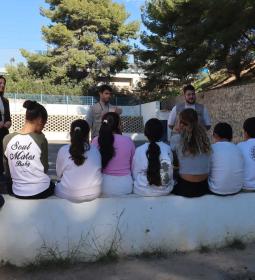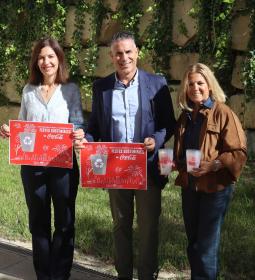The speaker affirms that Benidorm is the “most efficient” municipality in Europe's water management and that the high seasons “will last until October”
Jorge Olcina analyzes the impact of climate change on tourism activity in Benidorm

The researcher Jorge Olcina, Professor of Regional Geographic Analysis of the University of Alicante (UA), guest professor at different European and American universities and, among other positions, president of the Association of Spanish Geographers (AGE), has given the conference 'El climate change, impact on tourism activity ', within the twelfth cycle of conferences of the Opinion Club that has the collaboration of the City of Benidorm
The event, which was attended by the mayor, Toni Pérez, and the Councilor for the Environment, Mónica Gómez, along with other representatives of the corporation, has gathered 200 people in the Assembly Hall of the City Council who wanted to meet first hand the impressions of one of the largest authorities in the country in what, from the scientific point of view, is the hypothesis, as the speaker stressed, of climate change, a planetary natural process from which we increasingly get more confirmations of the manifested anthropic alteration in the rapidity of the evolution of climatic situations ..
In his dissertation, very enjoyable, concise and of high pedagogical value, the researcher has highlighted the difference between time and climate and has pointed out the two positions before the phenomenon. On the one hand the fight or mitigation that tries to reduce the emissions of CO2 and other gases into the atmosphere and, on the other hand, the adaptation to the situation that is presented to us by territories and societies.
It is clear to the professor that the weather is changing "because it has always changed." He recalled the 'Little Ice Age' that the planet lived between the early fourteenth century in the mid-nineteenth century and the current situation has highlighted the increase in DANA (Isolated Depression in High Levels), which “here we have always known as 'cold front', the cyclogenesis that are formed in the Mediterranean itself ”that have increased and are“ suffered more by the effect of human action ”.
"The climate," he said, "has ceased to depend exclusively on natural processes" which makes it "more extreme." Olcina has revealed that the Mediterranean Sea has risen 1.5º on average since 1980 to the present day.
Jorge Olcina, in addition to taking measures against warming, proposes to “adapt” to this new situation and has set as an example the work done in Benidorm in aspects such as water management. "Benidorm is," he says, "the most efficient municipality in Europe," with a percentage of "94% efficiency" in water management. Olcina believes that both the Local Administration and the tourism sector, thanks to the “compact” vertical city model, have the “tools to adapt” to the situation. A key in the process, he insisted, is the adaptation of territories and societies, insisting that, for the latter, the main question is “explain what happens, with accurate and reliable data, to accurately demonstrate the magnitude of the situations” because "The climate is nothing more than the perceived sensation of a reality."
Olcina predicts that "the tourism sector of Benidorm will not have problems in the short and medium term since the models point to an extension of the season" that "may extend until October", so that the city can continue to develop tourism, although he has specified that "we cannot sleep on the laurels" and we must continue working to further consolidate Benidorm as a "success model".
The climate change hypothesis, he said by way of conclusion, will affect a city like Benidorm “that is working in an exemplary way” on issues of temperature, with specific incidences of climate comfort, and water, where Benidorm's management is very efficient and example at European level.





